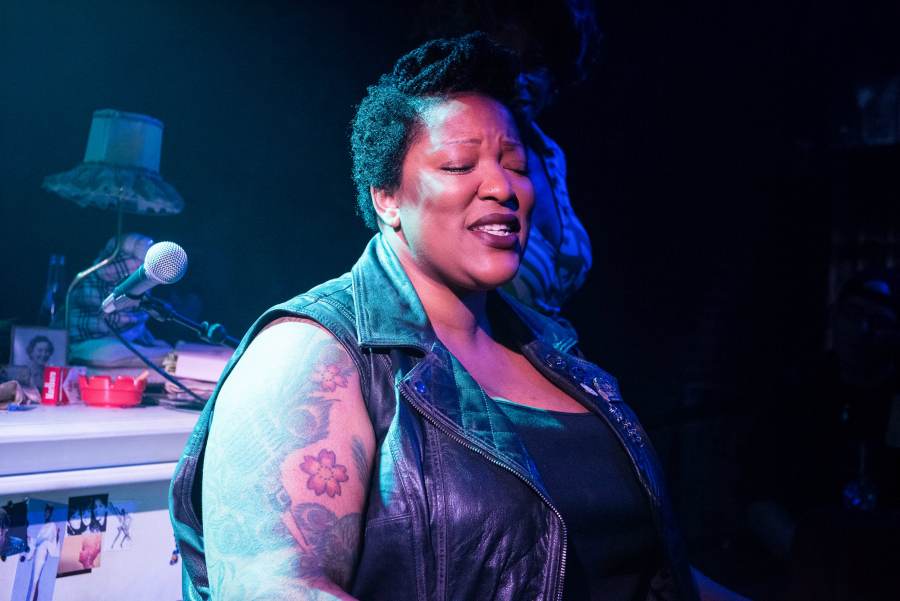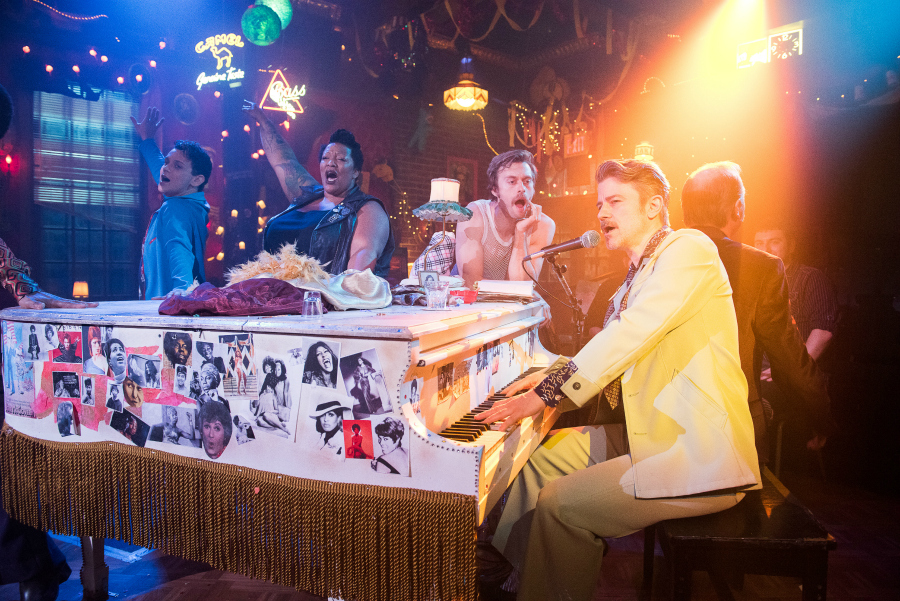

Every time Henri speaks in The View UpStairs, the world stops to listen. Not only because she is the woman running the bar where the show takes place, but also because she is played by the incredible Frenchie Davis whose voice has always demanded we stop and listen. Her precise, pristine instrument made her a star on American Idol, made us move our hips as she became a disco diva, and wrenched out hearts as she took the stage in Rent and Dreamgirls. But even when she’s not singing, Frenchie Davis makes one feel she speaks because what she has to say needs to be heard. It’s the reason why she makes Henri such a compelling character in this ensemble piece by Max Vernon, even behind the bar, Davis’ expressive face allows us to see Henri is living history, she has seen, and been through a lot, and we’re all the luckier for getting to hear her tale. I spoke to Davis about her work in the show, how making art helps her deal with dark moments, and what musicals she would like to do next.
Why did you want to be in The View UpStairs?
When I first read the script I was blown away by how few people knew the story that inspired it. I loved the way the piece explored how much progress we’ve made, while also highlighting the areas where we still have a lot of work to do. I loved the script and was honored Max Vernon and Scott Ebersold even considered me for the role of Henri, I watched the book and music evolve since we did the workshop last March. It’s not often you’re allowed to make a commentary on history and the sociopolitical moment, while doing the art. I was spoiled by making my Broadway debut in Rent, I was spoiled because you don’t often get to be in pieces that comment on the world around us.
The Election happened in between the workshop and the production…
...and Orlando happened.
….right, it was a hard year to get through! How did 2016 affect your work and how you approached Henri?
As a black woman who’s also LGBT, I’m outspoken about how sometimes white supremacy can overrule these other identities when we start having conversations about equality and bigotry in this country. Just like that line in the show about people in the apps saying “no blacks, no Asians”, we’d be lying if we didn’t acknowledge there is bigotry that exists in our community. I’ve found myself addressing biphobic members of our LGBT community, correcting racially insensitive and transphobic statements from other members of the African American community. The intersection at which my queerness and my blackness meet can often be a slippery slope.
In our struggle for equality we often don’t include other identities, 60 something percent of women voted for Trump and I found that really interesting because historically we have someone like Susan B. Anthony who despite being an activist had racist attitudes towards black women like Sojourner Truth, Harriet Tubman, who wanted to be part of the suffrage movement. We’d be lying to ourselves if we said all these women and men who voted for this man are all Republicans or heterosexuals. I think it highlighted for me that sometimes feminists pick white supremacy over their vagina, sometimes queer people pick their whiteness over truly struggling for equality. We often hear people use the Loving case as a precedent for marriage equality, or now that we’re fighting for our trans brothers and sisters louder, we hear people say it’s not about bathrooms just as it wasn’t about water fountains.

We often hear people compare the struggles of LGBT people with the Civil Rights movement, even when it comes to the violence, but for me Matthew Shepard and Trayvon Martin are the same, because just as I know in my soul that if Matthew Shepard had been straight he would still be alive, I know if Trayvon Martin was white he would also still be alive...so my point is that as Henri it was important for me to bring the struggle of a woman being a lesbian in the South in the 70s, but also a black woman who’s a lesbian in the South in the 70s. The Upstairs Lounge was a safe place for so many people, one of the reasons why we don’t know much about it is because people who survived the fire were afraid of being outed, when reporters came to the memorial people wanted to leave through the backdoor because they were afraid of being photographed, until a lesbian woman said “fuck that, I’m going out the front door”. I’ve tried to honor the Audre Lordes and the Marsha P. Johnsons in our struggle, all these black voices that often are left out of the conversation, the people who sometimes have fought harder for equality. So there was historical context in the way I processed this election. As an LGBT person you can live your life in the closet, but there’s no closet for blackness.
I truly love this and, as a queer person of color, I couldn’t agree more.
Thank you. All I want in the show is to make justice to Henri, even though I think of myself as femme, Henri is butch, she’s tough, which I can certainly be when I need to, but I wanted to make justice to her story and the black LGBT people who have fought so hard to create a world where we can live in our truth without fear of persecution. I remember when my ex-partner and I had celebrated our first anniversary, we ran into photographers, I was out to my family but not publically. I knew I had an upcoming interview and decided to talk about my love life openly. I told my father about it and he’s the most supportive man, but I remember tears falling down his face and he said “I rode the back of the bus, I lived in a time when you could be killed for dating a white woman…” he remembered so vividly the danger that living like that represented that he was afraid for me even in 2010. He was mortified! He lived at a time when people were lynched for being black and gay. Emmett Till was killed for whistling at a white woman, he remembered that, and was terrified about me dating a white woman. I will never forget that.
Does making art help you fight this fear?
I do. Making art and living in my truth. The world is a scary place that often tells us not to live our truth or be who we are, so creating art and taking that leap of faith help. I remember telling my dad not to be afraid, I was not going to let the world bully me into a closet, to me that was unsafe, I can’t live like that. To me it’s far more dangerous to live a lie, than to maybe be exposed to persecution for living your truth. At the end of the day I need to like who I see in the mirror. Friends, fans, lovers...they all come and go, at the end of the day I’m stuck with that bitch in the mirror, so I better make sure I like her! (Laughs)
You originated Henri, but you’ve also played parts made famous by other people. What’s the difference in how you approach them?
Henri is the first role I’ve originated, I think Max Vernon is a genius, so I don’t take this lightly. I haven’t felt this sense of family and pride since my Rent days. When you originate a role there is no pressure about being compared to someone else, I don’t know why we do this to ourselves and others, but we see a role and compare it to everyone who’s played that role. My friend Mark Ford who played Collins in Rent passed away recently, and he was my favorite Colins, I’m sure somebody is probably deciding between me and other fabulous performers as to who their favorite “Seasons of Love” soloist is, and we do that. I get compared to Jennifer Holliday and Jennifer Hudson all the time, because we all played Effie, sometimes it can be a lot of pressure, you need to give yourself the little pep talk “I only know how to do what Frenchie does”, hopefully people will take something positive and if they don’t that’s OK too, time and maturity teach you that you won’t be everyone’s cup of tea, some people are coffee drinkers and there’s nothing wrong with that.
I noticed there is no Sondheim on your resume, are there any of his works in your bucket list?
I love me some Sondheim...if they would ever consider letting a black woman run the pie shop in Sweeney Todd I’d be down for that. I love the challenge of singing Sondheim, your technique has to be on point because he writes like 50 million notes per measure, so your diaphragm better be ready. So many people get caught up in the gore of the show, but I love the message which is: if we succumb to anger and bitterness we become monsters. Sometimes you gotta let shit go, holding on to anger is like drinking poison and expecting the other person to die.
For more information on The View UpStairs click here.